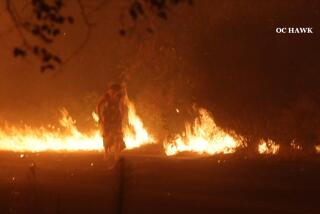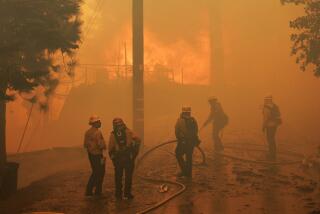The story behind the photos: How a group of friends saved a stranger’s house in Ventura
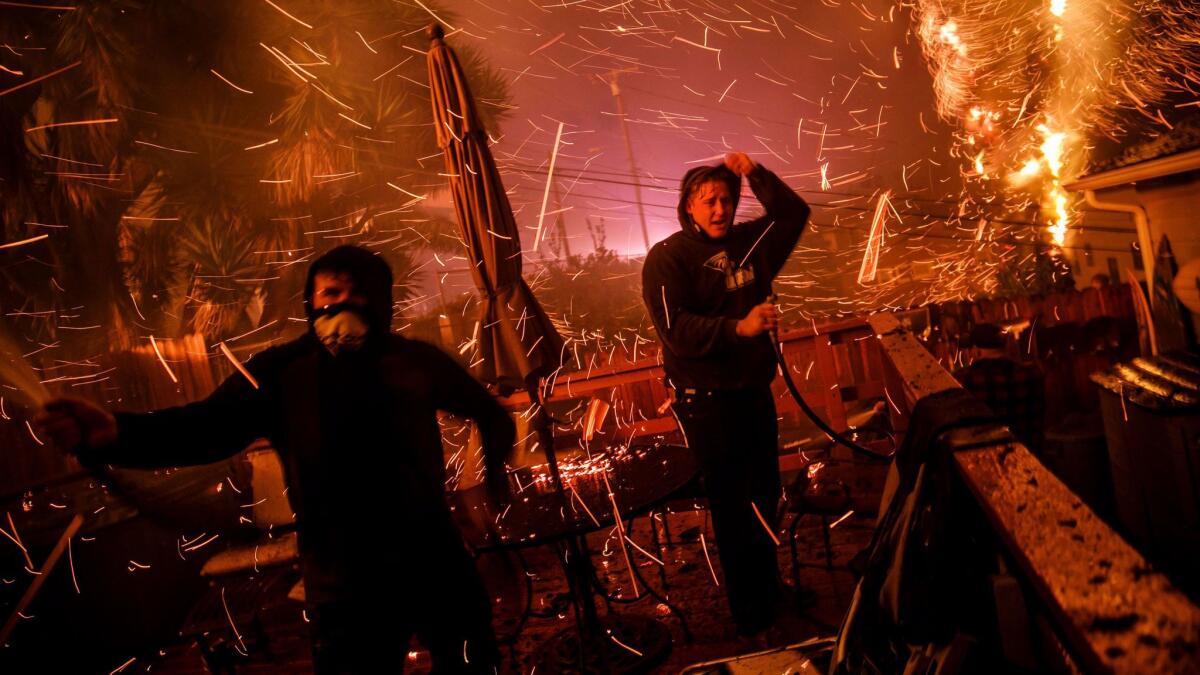
L.A. Times photographer Marcus Yam captured dramatic photos that showed five friends fighting the Ventura blaze with garden hoses late Monday night. The photos turned into a Twitter moment and were seen by thousands of people. We talked to Marcus about how he got those shots, how to do your job in a fire, and what happened next.
Question: What was happening before these shots were taken? Where were you?
Marcus Yam: I was supposed to go to Santa Paula that night, but because of evacuation traffic, if I tried to get into the fire zone it would be too time-consuming.
I realized the wind was blowing really hard. I looked at a map and I said to myself, the winds are going to blow the fire to Ventura at some point, so I went and planted myself there and waited for the fire to come to me.
I didn’t even have to wait long. Ten minutes. It got here so quick. You see the fire coming down the hill on the eastern side. I snapped some photos, turned around for a second, then I looked back and the fire was already at the bottom of the hill and coming up toward me.
When I got to that neighborhood, I found a house that was completely engulfed in flames. Then — I don’t know how to describe it, but I heard a noise in the background, people screaming, screaming at each other. In the commotion of the fire happening, the sounds of fire trucks and everything going on, it’s hard to pay attention to all the little stuff.
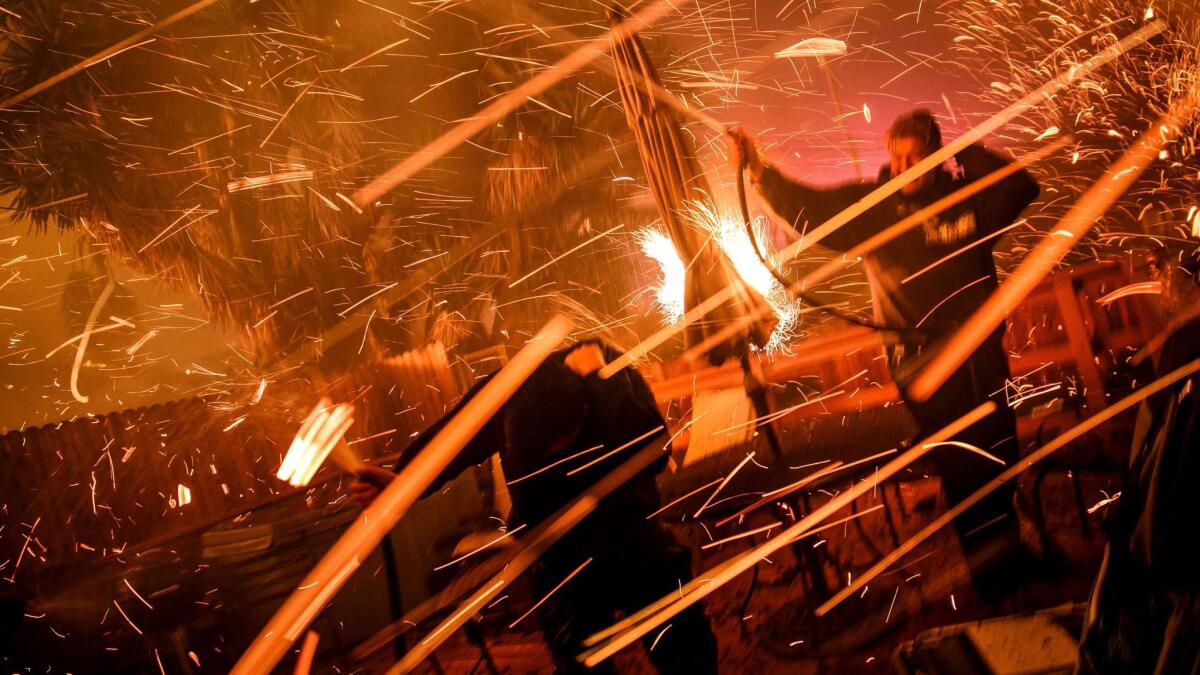
The house where the noise was coming from looks dead, like no one’s home. So I walked up the driveway and I could see embers flying up there, and I see a bunch of guys in the backyard with hoses trying to water down parts of the house where the embers were falling.
I was like, what is going on? Journalistically, I was like, this is more interesting than the burning house.
I asked the guys where they were from. They were five high school buddies from Camarillo. When the power went out that night, three of them went outside and could see the fire far away. They decided to do something about it.
They were driving around and they said they spotted this house. The palm tree was on fire, and the tree was releasing embers into the air. They just started commandeering all the garden hoses. The owners weren’t there.
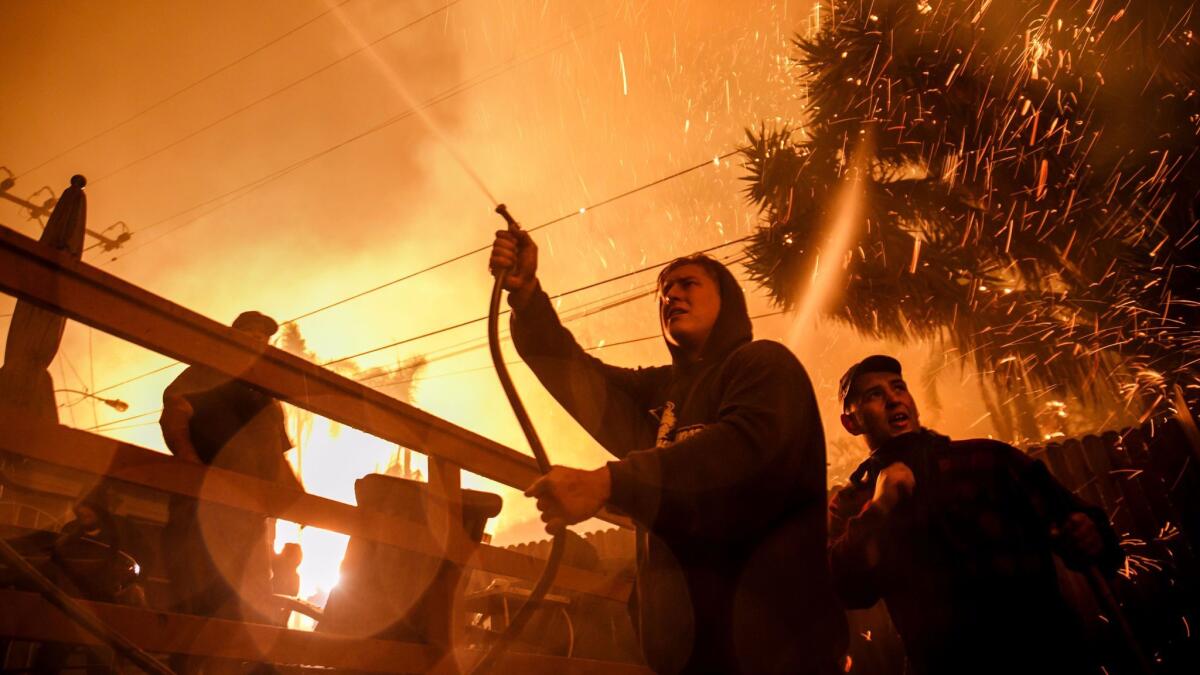
Q: This wasn’t their house?
MY: No. They were just strangers. I was just thinking, wow, this gets more interesting, five strangers. What they were doing, it almost seemed like theater. They would all yell “Roof! Roof! Roof!” and point their hoses at the roof, and then yell “Garage!” and all point at the garage. They just barely managed to keep the embers from burning up the place.
I think the house is still there. It looked pretty watered down. The fire in the palm tree was out.
WATCH: Dramatic video shows the friends trying to save the house:

Five friends from Camarillo came together to try and save a house in the Ventura fire. This is what it looked like.
Q: What happened after you took these shots?
MY: I had to drive off. It was like it was raining embers. I put on a scarf to try to cover my neck and all that because I can feel embers falling on my face, embers hitting my face every way. I was completely soaked in water and covered in embers, so I was gray, just dirty and wet and cold. It was freezing that night.
I saw people waiting until the last minute to evacuate. People were narrowly escaping that street when it was engulfed in flames. I might have been the last one to drive out.
I drove through a wall of fire to get out of that street. I could feel the heat in my car. It was a scary moment. Everywhere I go are embers falling like rain, basically. I was careful not to leave my car door open or anything like that — an ember could fly in and set my car on fire.
After that I drove around to get more photos. I backed up a little bit, waited for the fire to catch up to me, backed up a little bit more, street by street.
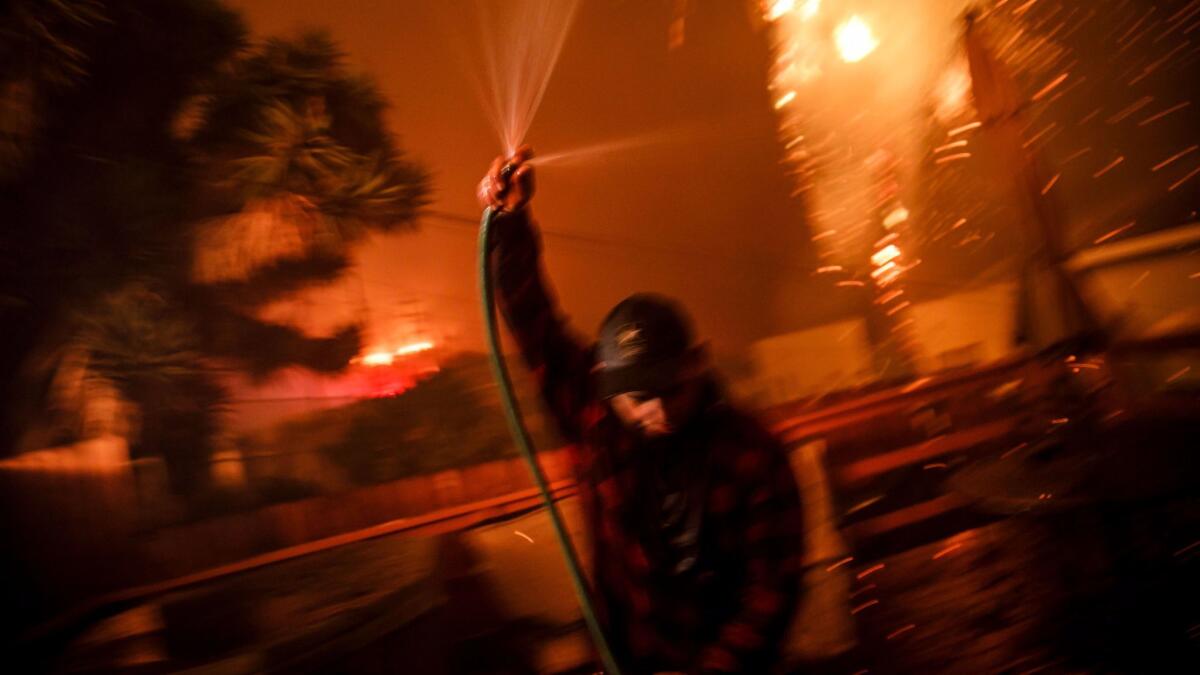
Q: What have the past few days been like for you, since the fires started?
MY: The last few days have felt like a single day. Last night [Tuesday] was the first night I slept. I worked through that first night [Monday], worked through sunrise, worked through the day after that.
I finally got a hotel room at 8 or 9 p.m. Well, actually, a reporter got a hotel room and I just crashed with him. Usually with these fires getting a hotel room is so rare, so I take any opportunity to sleep on a bed. I’m always sleeping in my car, my driver’s seat is like a bed. I sleep in my car every fire.
Q: You’ve photographed a lot of fires. What are some things you look for when you’re taking photos of fires?
MY: I pay attention to the wind and where the fire’s going. A lot of it depends on the wind and how the wind is moving. I’m constantly putting my hand in the air to feel the wind. Constantly having to get in front of the fire, park in front of the fire and wait for it to come to you.
I look out for people. The day of the fire you try to get confusion. The day of, it’s chaos. I run up to people while they’re evacuating, explain myself and who I am, and tell them I just want to take some pictures, ignore me, do what you have to do and get out to safety.
The next phase is going out and getting all the firefighters at work, trying to assert some control on where the brush fire is going. It’s hard when the wind conditions are as bad as they were on Monday. I was listening on the radio, all the chatter that was going on, the firefighters just couldn’t keep up with the pace of this fire.
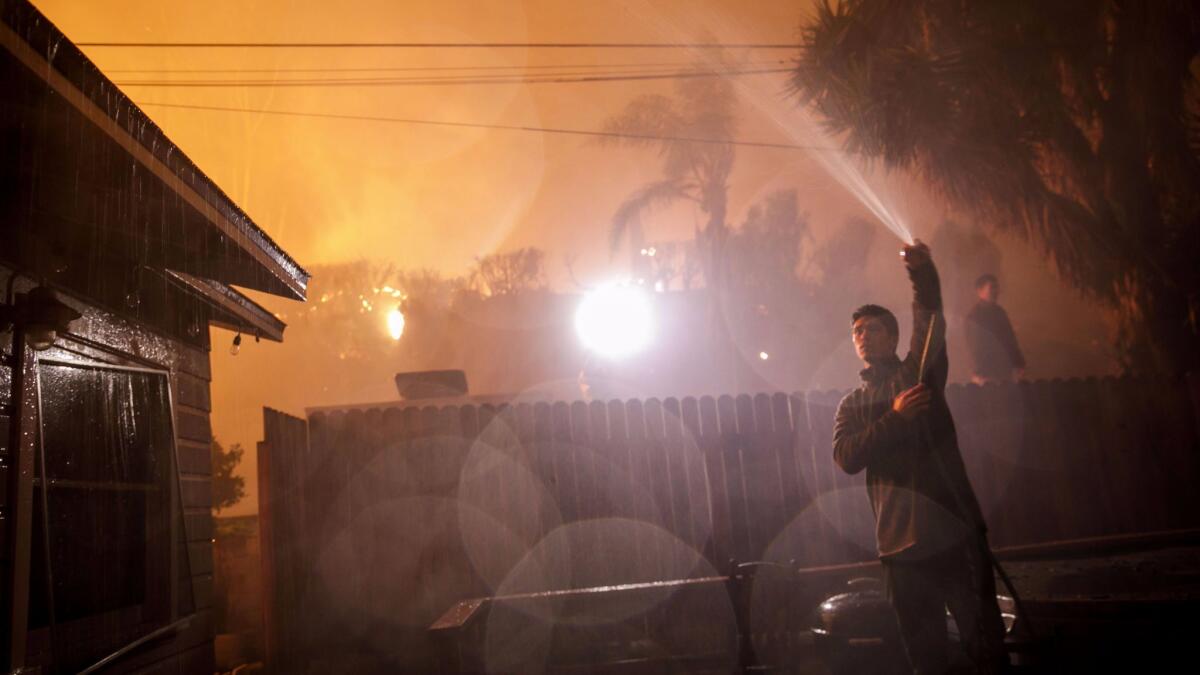
Q: When you take these photos, are you alone or is someone else driving with you? Do you worry about the danger?
MY: I do it solo. I’m on my own, I’m listening to the fire channels on the radio, I’m stopping and checking Twitter so I can have a rough idea of what’s going on.
I think about safety all the time and trying not to get trapped by the fire. When I drive up a street like the one I was on in Ventura, I was looking around thinking about how it’s one street in and one street out. I realized I could get trapped there if I didn’t leave when I did.
Then again, anything is dangerous these days. I feel like crossing a street in L.A. is equally dangerous if you’re not paying attention. I’ve done other assignments that are equally dangerous. It’s all about mitigating risk, understanding what the risks are and not taking too much of it.
The last thing you want to do is become a hazard or casualty, and the other last thing you want is for the firefighters to have to come save you. I don’t want that. That must be so embarrassing. We’re going into these situations of our own volition, so if we get hurt it’s our fault. We have to save ourselves and we have to be aware of that fact.
Q: Were you surprised when your tweet went viral and became a Twitter moment?
MY: Yeah, sort of. I don’t think about how viral it will go when I’m working. During these kind of events, I tweet out photos as soon as possible. I do it on the spot sometimes. I’m providing information that some people may find useful.
I photographed a lady packing up a car with a fire behind her house. I got an email from her kid saying, “I couldn’t reach my mom, but I saw your photo and so I know she’s alive and she’s out.”
I asked Marcus if he knew what happened to the friends or to the house after he left. He didn’t, but he gave me their names and contact information. Their names are John Bain, Brylle San Juan Wilson, Matthew Serna, Brandon Baker and Prescott McKenzie.
I asked John Bain if he knew whether the house had been saved. He said he visited it the next day. The house was still standing.
Note: This Q&A has been lightly edited and condensed for clarity.
Follow me on Twitter @jessica_roy.
More to Read
Sign up for Essential California
The most important California stories and recommendations in your inbox every morning.
You may occasionally receive promotional content from the Los Angeles Times.

